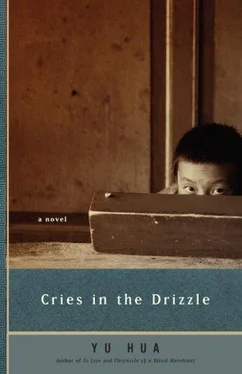My grandmother, who died when I was three, maintained habits that were quite out of keeping with my home environment at the time, as a way of demonstrating that the prosperous and respectable life that she had once enjoyed had not entirely disappeared. Despite our poverty we would light a charcoal fire in the cold of winter, and she would spend the whole day huddled beside it, her eyes almost shut, a blank expression on her face. Before she went to bed she would always bathe her feet in hot water, and after a soaking those misshapen little feet of hers would gradually take on a rosy hue, an image that has printed itself indelibly on my memory. Those feet had never stepped into a rice field, even though she had slept with a peasant for over thirty years. Her indolent, aristocratic air somehow succeeded in wafting unimpeded for decades through our tumbledown house. My grandfather, so prone to fly off the handle (according to my father), in my eyes stood humbly, his hands at his side, before Grandmother's foot basin.
On a winter morning when she should have risen from her bed my grandmother failed to wake. She died so unexpectedly, without the slightest warning, that my grandfather was immobilized with grief. If he ran into anybody in the village he would greet them with a timorous smile, as though some kind of family scandal had occurred, rather than his wife passing away.
In my memory the following scene takes shape. My grandfather Sun Youyuan is standing among billowing snowflakes, dressed in a black padded jacket that has no buttons; it is so filthy it has acquired a dull sheen. He is not wearing anything underneath, and has tied the jacket shut with a piece of string; the skin of his chest is exposed to the winter cold. Stooping, both hands in his sleeves, he lets the snow fall and melt on his chest. As he tries to smile, his eyes redden; tears tumble down his face — a vain attempt to communicate his grief to my insensible heart. I faintly recall him saying to me, “Your grandma was ripe for picking.”
My grandmother's father must have been the least distinguished rich man of his day. My grandfather, with a poor man's deference, never wavered in his esteem for this father-in-law, whom he had once had the privilege of meeting. In his twilight years, as his teeth dwindled in number, Sun Youyuan would often regale us with accounts of my grandmother's former high station, but it was the sighs of admiration — to us so meaningless — punctuating his reminiscences that made the biggest impression on us.
When I was little I could never understand why Granddad's father-in-law always had to have a ferule in his hand, rather than the string-bound book that I imagined he should have been holding. (Sun Kwangtsai, after all, could impose discipline too— though it was a broom that he clutched in his hand, he was simply using a different instrument for much the same purpose.) This ominous figure applied all the harshness of the old society, using his own pedestrian knowledge to educate his two equally mediocre sons and even, through a wild stretch of imagination, hoping that they would bring honor on their ancestors. Nor did he neglect the upbringing of his daughter, making a ritual out of practically every waking moment of her life. My poor grandmother did not view her submission to him as a surrender of the most basic freedoms, but in a spirit of blind happiness complied strictly with her father's rules on when to get out of bed, when to begin embroidering, what posture to adopt when walking, and so on. Later she inherited her fathers prestige during her marriage to my grandfather, and in Sun Youyuan's quaking presence my grandmother savored to the full her own superiority. My grandfather was enveloped all his life by her short-lived wealth and status. The only respect in which she carried herself with modesty was that she always made a point of sitting sideways opposite my grandfather. Her father's admonitions had been so forceful that she continued to be constrained by them long after she had in effect made her escape from his control.
He prided himself on his rigor, and when it came time to select a husband for his daughter his gimlet eyes immediately came to rest on a man much like himself. On the day that Grandma's first husband appeared stiffly before him, his daughter's fate had already been settled. This fellow, who had to think things over carefully before making the simplest remark, from my perspective today seems practically retarded, and compared to my destitute but vigorous grandfather he was a complete nonentity. But he pleased my grandma's father, and his satisfaction in turn directly influenced my grandma, for every time she mentioned him to my granddad a look of admiration would appear on her face. My granddad was a secondary victim, for the reverence with which he hung on her words made this fellow in a long gown become the yardstick by which he measured his own inferiority.
The feebleminded fiance, dressed in his silk finery, entered self-consciously through Grandmother's vermilion door, his waxed hair combed to perfection. He raised the hem of his gown with his right hand, crossed the courtyard, and walked into the reception room, skirting a large square table to appear in front of Grandma's father. And that was all it took for him to secure approval for the marriage. When Granddad told me all this, I had just turned six and was about to be placed in other people's care, and his account failed to stir very much interest on my part, just a faint degree of surprise. All you had to do was walk through an open door, make a turn, and a bride was yours for the taking. Well, I could do that too, I thought.
The extravagance of my grandmother's wedding was inflated in her imagination after thirty or more years of poverty, and then reported to me through the unreliable medium of my grandfather. So it was that my head resounded with the din of gongs and drums and a particularly loud horn, and in my mind's eye the entourage carrying the trousseau was so long it trailed completely out of view. My grandfather always stressed that the bride was conveyed in a large sedan carried by eight porters, but at six years of age I could hardly have taken in just how magnificent that was. Granddad's description was so vivid that it created a chaotic impression in my mind, and the worst thing was that the sound of the horn, which Granddad imitated most effectively, was as unnerving to me as the howl of a dog in the night.
My grandma was sixteen that year, and her face was like an apple about to fall from the tree, but she applied a thick coating of rouge to it all the same. As she was welcomed in from the sedan chair that afternoon, her face gleamed in the sunlight as brightly as an earthenware pot.
The dourness of the groom took my grandmother by surprise. Throughout the ceremony he wore what he considered to be a sedate smile, a smile so fixed and immobile that it could have been smeared on with paint. This fellow with his artificial grin did not maintain his gentlemanly profile in the latter part of the evenings activities. Once the candles had been lit in the nuptial chamber, the groom proved amazingly deft, and after a moment of shock my grandmother discovered that she was not wearing a stitch of clothing. He wasted no time with preliminaries, but did everything that could be expected of him without a word having passed his lips. When he woke the following morning he found that the bride had disappeared into thin air, and searched around frantically until he finally thought to have a look in the wardrobe. She was crouched there, stark naked, trembling from head to toe.
But he was a decent fellow. That, at least, was my grandma's final appraisal. I find it hard to imagine, but after traumatizing the bride on her wedding night he then delved deeper into his bag of tricks and provided the solace she needed. In the two years that followed, she greeted each night with equanimity and acquitted herself well. My grandfather Sun Youyuan claimed that her first husband was a man who knew how to treat a woman, but I suspect this is an image reconstructed by my grandmother over many years of remembrance. So continually did she harp on the past that no amount of meekness and humility on Sun Youyuan's part could gain much appreciation from her.
Читать дальше












